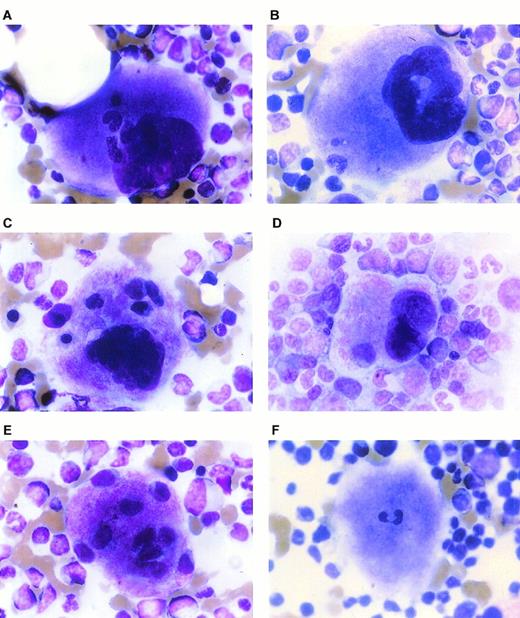Megahemopseudophagocytosis. A 78-year-old man with myelodysplasia (MDS) of the refractory anemia (RA) subtype evolved to chronic myelomonocytic leukemia (CMML) over several years. Unexpectedly, his bone marrow demonstrated 17% plasma cells and further evaluation was consistent with an underlying plasma cell dyscrasia (PCD). It is noteworthy that his bone marrow also showed a marked increase in megakaryocytes (A through D) and megakaryocytic fragments (E and F), many of which (48%) displayed engulfment of erythroblasts (A through C), PMNs (A, B, and F), and/or lymphocytes (A and C through E), up to 10 per cell. “Phagocytosis” of blood elements (red blood cells, crythroblasts, lymphocytes, and myeloid cells) by megakaryocytes has only been discussed sporadically in the literature and was termed emperipolesis (wandering of one cell into another) in 1956 (Humbel et al, Br J Haematol 2:283, 1956). Because neither cell is damaged, this phenomenon does not represent true phagocytosis. It has been described in leukemias, MDS, myeloproliferative disorders, reactive thrombocytosis, malignancies, HIV, and ITP (Rozman et al,Br J Haematol 48:510, 1981). The mechanism and significance is unclear, and various theories concerning cytokines, adhesion molecules, increased cell traffic across the marrow-blood barrier, megakaryocytic cytoplasmic protection against a hostile bone marrow environment, and response to injured or altered megakaryocytes has been postulated (de Pasquale et al, Br J Haematol 60:384, 1985). Our case exemplifies this unusual phenomenon and is possibly attributed to his MDS/and or PCD. Our patient’s megakaryocytes appear to be more extensively involved than what has been previously described in the literature (48% v 30%) and include the internalization of all cell types, which also seems to be somewhat atypical. A more descriptive and memorable term for this entity might be megahemopseudophagocytosis. (Courtesy of Nancy J. Freeman, MD, and Angelina C. Carvalho, MD, Brown University School of Medicine, Oncology Section, Department of Veterans Affairs Medical Center, 830 Chalkstone Ave, Providence, RI 02908-4799.)
Megahemopseudophagocytosis. A 78-year-old man with myelodysplasia (MDS) of the refractory anemia (RA) subtype evolved to chronic myelomonocytic leukemia (CMML) over several years. Unexpectedly, his bone marrow demonstrated 17% plasma cells and further evaluation was consistent with an underlying plasma cell dyscrasia (PCD). It is noteworthy that his bone marrow also showed a marked increase in megakaryocytes (A through D) and megakaryocytic fragments (E and F), many of which (48%) displayed engulfment of erythroblasts (A through C), PMNs (A, B, and F), and/or lymphocytes (A and C through E), up to 10 per cell. “Phagocytosis” of blood elements (red blood cells, crythroblasts, lymphocytes, and myeloid cells) by megakaryocytes has only been discussed sporadically in the literature and was termed emperipolesis (wandering of one cell into another) in 1956 (Humbel et al, Br J Haematol 2:283, 1956). Because neither cell is damaged, this phenomenon does not represent true phagocytosis. It has been described in leukemias, MDS, myeloproliferative disorders, reactive thrombocytosis, malignancies, HIV, and ITP (Rozman et al,Br J Haematol 48:510, 1981). The mechanism and significance is unclear, and various theories concerning cytokines, adhesion molecules, increased cell traffic across the marrow-blood barrier, megakaryocytic cytoplasmic protection against a hostile bone marrow environment, and response to injured or altered megakaryocytes has been postulated (de Pasquale et al, Br J Haematol 60:384, 1985). Our case exemplifies this unusual phenomenon and is possibly attributed to his MDS/and or PCD. Our patient’s megakaryocytes appear to be more extensively involved than what has been previously described in the literature (48% v 30%) and include the internalization of all cell types, which also seems to be somewhat atypical. A more descriptive and memorable term for this entity might be megahemopseudophagocytosis. (Courtesy of Nancy J. Freeman, MD, and Angelina C. Carvalho, MD, Brown University School of Medicine, Oncology Section, Department of Veterans Affairs Medical Center, 830 Chalkstone Ave, Providence, RI 02908-4799.)


